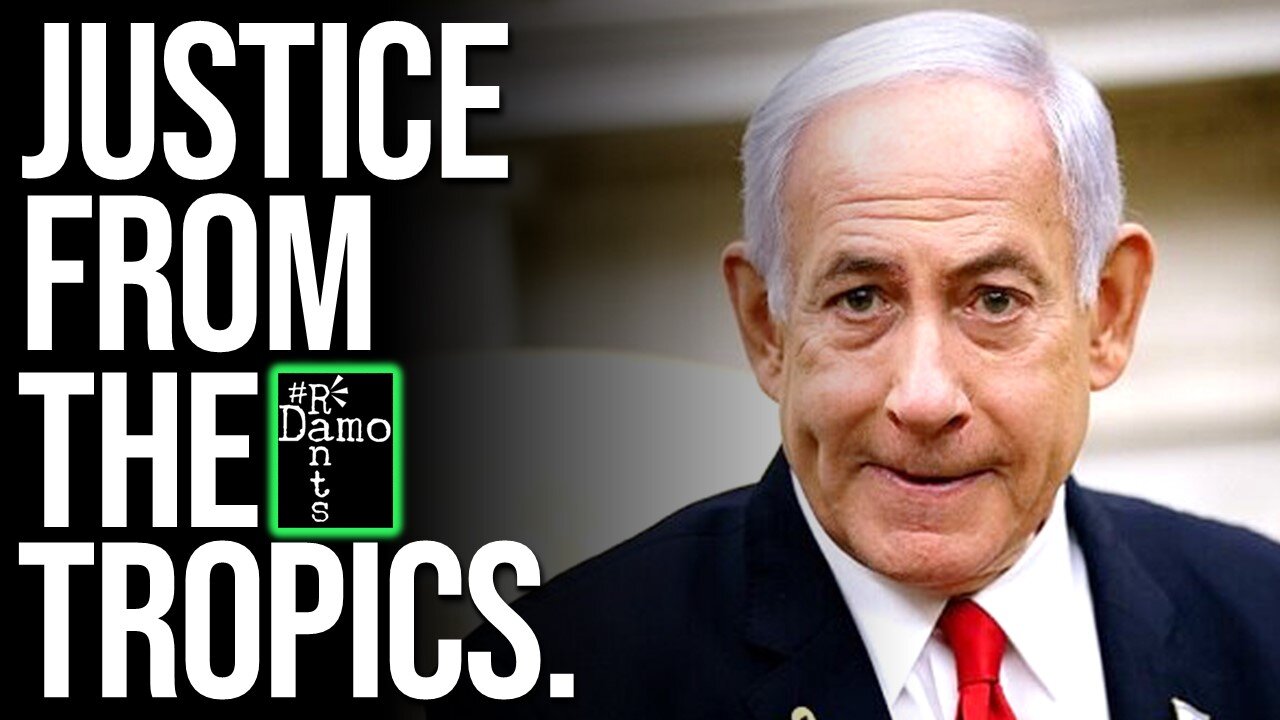Premium Only Content

Israel's Genocide Goes on Trial… But Not in The Hague
Right, so the Caribbean, once upon a time of course it was the backdrop for colonial conquest and slave plantations, but they are now flipping the script on all of that and taking a stand in court against that more present day colonial project, that being the genocidal apartheid state of Israel. As Western governments tie themselves in diplomatic knots defending the indefensible over Gaza, the West Bank and beyond, a wave of moral clarity has crashed in from a rather unexpected quarter. These small island nations, often ignored on matters of international justice, are now wielding all of their legal tools and anti-colonial credentials to stand up for Palestine. What began as whispers of protest beneath the palm trees have grown into a coordinated regional demand for accountability, with courtrooms in Barbados now doing what too many in the West dare not: calling Israel’s actions in Gaza by their true names—genocide, apartheid, and war crimes. It’s another one of those moments where the world is reminded that true justice doesn’t always come from the biggest voices or the most powerful militaries—it often comes from those who remember all too clearly what injustice looks like because they’ve lived it, survived it, and built their nations from the ruins of it. Now, they are demanding the world pay attention to them as they take on Israel, so naturally Western media haven’t said a dickie bird about it have they?
Right, so in a quiet courtroom in Bridgetown, Barbados, a case is unfolding that could shake the foundations of international law and diplomatic convention, largely it has to be said, because they’re shaming much bigger and more powerful judiciaries for doing what they won’t. Nom, all of this is happening in a small Caribbean nation whose moral clarity and legal resolve are making those larger judiciaries look as weak and pathetic as they are. The Caribbean—often dismissed rather unfairly as something of a geopolitical backwater—is asserting itself as a principled force on the global stage, refusing to remain complicit in the atrocities being committed in Gaza. Through strategic litigation, grassroots mobilisation, and coordinated regional diplomacy, Caribbean states and civil society groups are confronting Israeli impunity and the Western consensus that has enabled it for decades.
The Caribbean has been shaped by its anti-colonial heritage and historical struggle for justice, so actually it is entirely appropriate that it is here that they are now playing a leading role in challenging Israel’s actions in Gaza and it is for those historical reasons in part at least I daresay, that we see such Caribbean solidarity with Palestine.
Parallel to this genocide case in Barbados, a coordinated campaign has emerged across the Caribbean calling for a total arms embargo on Israel. This effort, spearheaded by over forty civil society organisations, represents an unprecedented alignment of legal, political, and ethical concerns. These organisations are pressing CARICOM governments to take concrete action by ending the export or transit of military and dual-use goods that could be used in Israel’s war effort against Gaza.
The CARICOM – or Caribbean Community as that stands for- governments in this context refer to the 15 full members of the group, states including Jamaica, Barbados, Trinidad and Tobago who as full members have authority over both domestic and foreign policy decisions. These are the governments being called upon by civil society and international observers to take actions such as imposing arms embargoes on Israel, withdrawing diplomatic support or relations ad upholding international legal obligations in response to Israel’s actions in Gaza.
The movement demands not only a cessation of arms shipments, but also a comprehensive refusal to allow Caribbean-flagged vessels to transport any such goods to Israeli ports.
These groups are also demanding the suspension of all diplomatic engagements, cultural exchanges, and sporting relationships with Israel. They argue that continuing normalised relations in the face of genocide amounts to complicity. Instead, they are calling on CARICOM nations to publicly align themselves with ongoing international legal processes, including the International Court of Justice case brought by South Africa and the criminal investigations being pursued by the International Criminal Court.
Governments across the region are now being forced to respond to this growing public and political pressure. Where many of these states have been traditionally cautious in their approach to contentious foreign policy issues, these states are finding it increasingly difficult to ignore the mounting demands of their populations and civil society groups, especially in light of so much of the islands history. According to reports from Middle East Monitor and Press TV, debates are now occurring in national parliaments over whether to introduce embargo legislation, and high-level diplomatic ties with Israel are under review.
One of the less obvious but highly strategic angles of this movement is its focus on maritime leverage. Many Caribbean nations maintain global shipping registries, often referred to as “flags of convenience,” which are frequently used by international shipping companies. These flags grant vessels access to ports and shipping lanes and shield them under the legal jurisdiction of the registering country. By denying these flags to any ship transporting military or dual-use equipment destined for Israel, Caribbean nations could impose real logistical and financial costs on Israeli supply chains, particularly as the country becomes more reliant on foreign resupply amid its continued military operations. So for anybody who is thinking, well what can the Caribbean possibly do? The answer is a lot as it happens.
The call for an embargo has been further legitimised and amplified by developments at the international level. On July 3, for example, UN Special Rapporteur Francesca Albanese delivered a scathing report before the Human Rights Council, declaring the situation in Gaza to be “apocalyptic” and urging all states to sever military, economic, and political ties with Israel. Her report did not merely suggest policy—it called for urgent, enforceable sanctions, and was widely circulated among Caribbean lawmakers and activists. In this sense, the Caribbean is not acting in isolation but as part of a growing global chorus demanding that states no longer enable or excuse the ongoing atrocities in Gaza.
So this movement is far from just a symbolic gesture. It is a coordinated, strategic effort to transform the Caribbean into a region of legal and logistical resistance—a zone in which Israel’s impunity is neither accepted nor facilitated. The implications for international trade, diplomacy, and military logistics are far-reaching, and the Caribbean’s actions may very well set a precedent for other regions of the Global South to follow.
The actions of Caribbean states and activists are beginning to reshape global diplomacy. While small in population and economic power, the region is punching far above its weight in international law and political influence, because it is in a position to do so.
Support for South Africa’s ICJ case is growing in Latin America, Africa, and Southeast Asia. A ruling from a Caribbean court affirming the genocide designation would lend unprecedented legitimacy to this effort. It would also embolden other postcolonial nations to launch similar legal or diplomatic challenges.
The Caribbean’s influence extends through its participation in international forums. CARICOM member states vote in the UN General Assembly and hold observer or partner status in blocs like CELAC – the Community of Latin American and Caribbean States - the African Union, and the Non-Aligned Movement. A unified Caribbean position could shift voting patterns and fracture the political consensus that Israel and its allies have for so long depended on.
Economic implications are also looming. If Caribbean-flagged ships are barred from transporting arms to Israel, or if regional ports refuse docking rights to Israeli military-linked cargo, it could create logistical nightmares for Israeli procurement. Maritime chokepoints matter—especially when international law begins to converge on accountability.
Caribbean diaspora communities and younger generations across the region and abroad are now taking an active role in redefining what solidarity looks like in the 21st century. Their resistance is not confined to courtrooms or diplomatic channels—it is vibrantly alive in protests, performances, and online campaigns that challenge the cultural and ideological pillars sustaining Israel’s impunity. It’s why we’re seeing such an authoritarian crackdown on such things here in the UK by contrast.
Musicians like Bob Vylan, who drew global attention at Glastonbury for chanting “Death to the IDF,” might have shocked many, but they are not isolated provocateurs. They are the cultural vanguard of a broader Caribbean-British and Afro-diasporic movement linking Palestine to anti-colonial, anti-racist, and decolonial struggles across the globe. Rather than back down amid media condemnation, they have doubled down, continuing to speak out and mobilise fans and allies with unflinching clarity.
Similarly, activist networks such as Youth Demand and Palestine Action have drawn young Caribbean voices into direct action across the UK and elsewhere. Their interventions—whether in public marches, red-paint disruptions, or solidarity teach-ins—illustrate the intergenerational links between historical Caribbean resistance and contemporary global justice. They are shifting public opinion and forcing mainstream institutions to reckon with their complicity.
On university campuses and in digital spaces, students and scholars from the Caribbean are elevating conversations about Gaza, settler colonialism, and legal accountability. They are connecting the dots between transatlantic slavery, Indigenous dispossession, and the siege of Gaza, drawing together a narrative from their broader roots which is relevant and that refuses to be compartmentalised or depoliticised.
This cultural resistance amplifies the legal and diplomatic dimensions of the Caribbean’s engagement. It ensures that the push for justice is not only top-down but bottom-up—rooted in the voices of those who understand, from lived and inherited experience, what it means to be dispossessed, dehumanised, and denied. Caribbean nations built themselves to what they are today on the back of such a history as we all ought to know full well.
Israel’s traditional sources of strength—military power, intelligence alliances, and support from powerful Western capitals—are proving inadequate to stem the tide of legal and moral delegitimisation emerging from, certainly as shown in this case here, the Global South. The propaganda, the hasbara isn’t working. The Caribbean’s assertive interventions, especially through the legal and diplomatic avenues that are now underway, represent a unique threat not to Israel’s battlefield superiority but to its global narrative control and legal impunity.
When declarations of genocide and apartheid come not from adversaries but from Commonwealth allies, small democracies, and Black-majority postcolonial states, the old smear tactics lose their potency. It becomes much harder to dismiss such criticism as antisemitic or rooted in terrorism. The moral framing collapses under the weight of its own contradictions. The narrative Israel has spent decades building—that of a democratic, besieged nation defending itself from terrorism—falls apart when its actions are condemned by nations with no stake in Middle Eastern geopolitics at all, but have a very large stake and deep investment in anti-colonial justice.
Legally, the walls are closing in. The genocide case in Barbados, if successful, will likely trigger legally binding obligations not just for that state but potentially for others in CARICOM with similar legal frameworks. Israeli officials, businesspeople, and even tourists could find themselves barred from entering or at risk of arrest under universal jurisdiction statutes. Moreover, such rulings would lend powerful support to the International Criminal Court’s ongoing investigations and to the growing list of countries aligning with South Africa at the ICJ.
This is the slow-burning threat Israel cannot bomb or lobby its way out of. It is a legal, diplomatic, and cultural reckoning grounded in the principles of international law and human rights, and powered by the moral authority of formerly colonised peoples demanding accountability.
The growing pressure from Caribbean governments, courts, and civil societies is also causing deep discomfort among Western allies who continue to arm, shield, and politically defend Israel on the global stage, which is why I guarantee you’ve heard next to nothing about all of this, because if it cropped up in mainstream media, it’d be royally embarrassing to the status quo. The contradiction between Western states’ professed commitment to human rights and their steadfast support for a regime now formally accused of genocide has become impossible to ignore and now seems to be more about damage limitation.
Barbados, as a Commonwealth realm, presents a particularly acute challenge to the UK government. Should its courts issue declarations of genocide and demand sanctions, the UK will be forced to either acknowledge the legal findings of one of its closest historical partners or reveal, through inaction – and this is far and away the likelier scenario - that it prioritises Israeli relations over justice. The same holds true for Canada, which claims to uphold a feminist foreign policy and Indigenous reconciliation while simultaneously backing a state accused of erasing another Indigenous people.
The United States, perhaps the most compromised of all, continues to veto UN resolutions, send weapons shipments, and shield Israel from accountability. But as more nations across the Global South speak in one voice—echoed now by their diaspora communities in Western capitals—the cost of maintaining this position will grow. Domestic pressure will increase. Protests will intensify, you can’t designate everyone a terrorist and lock them all up after all. And the moral credibility of Western democracies will deteriorate further in the eyes of the world.
The Caribbean has exposed the West’s double standard: it champions international law when Russia invades Ukraine, but scorns it when Israel invades Gaza. It decries terrorism when it targets European cities, but funds and excuses it when it flattens refugee camps in Rafah. That hypocrisy is being documented, challenged, and dismantled—and the challenge is being led by the very nations the West once colonised.
The Caribbean is no longer a passive player in global affairs, it is stepping up here. It is not waiting for Washington, London, or Brussels to define justice. It is doing so on its own terms—through its courts, its diplomacy, its civil society, and its historical memory.
From the genocide case in Bridgetown to the embargo demands in Montego Bay, the region is demonstrating that moral leadership does not require military might. It requires principle, persistence, and the willingness to act when others stay silent.
In confronting Israel’s crimes in Gaza, the Caribbean is also confronting the legacy of colonialism, racism, and impunity that has long defined the global order. It is standing not only with Palestine, but with all peoples who have been told they are too small, too brown, or too late to matter.
This is not just a regional moment. It is a global shift. And it may just be the beginning of a new era in international justice—one where the margins speak loudest, and the powerful are finally made to listen. Well we can certainly hope can’t we?
Certainly the reception the aforementioned Bob Vylan are getting outside Britain is bearing out he impact of such messaging as they have made and this legal case is bringing in the Caribbean. They even had an all new message for the IDF as well. Get all the details of that story in this video recommendation here as your suggested next watch.
Please do also hit like, share and subscribe if you haven’t done so already so as to ensure you don’t miss out on all new daily content as well as spreading the word and helping to support the channel at the same time which is very much appreciated, holding power to account for ordinary working class people and I will hopefully catch you on the next vid. Cheers folks.
-
 LIVE
LIVE
Drew Hernandez
10 hours agoDISNEY CUCKS FOR KIMMEL & ADDRESSING THE CHARLIE KIRK MEMORIAL AFTERMATH
1,119 watching -
 1:02:28
1:02:28
Flyover Conservatives
9 hours agoThe Most Overlooked Way to Fight Abortion (It’s Not Protests) - Robert Netzly; Why Triple-Digit Silver is Coming - Dr. Kirk Elliott | FOC Show
35K3 -
 1:55:33
1:55:33
Glenn Greenwald
8 hours agoDeceitful Hysteria over Tucker's Speech on Kirk; IDF Funder Larry Ellison to Take Over CBS, Paramount, and now TikTok; U.S. Embraces Leading Al-Qaeda Terrorist | SYSTEM UPDATE #519
181K88 -
 34:40
34:40
Donald Trump Jr.
10 hours agoWe Will Make Charlie Proud | TRIGGERED Ep.276
210K90 -
 1:01:49
1:01:49
BonginoReport
9 hours agoErika Kirk Forgives Charlie’s Assassin - Nightly Scroll w/ Hayley Caronia (Ep.139)
115K97 -
 1:54:19
1:54:19
megimu32
6 hours agoOn The Subject: Rush Hour | Would It Be Cancelled Today?
43.3K6 -
 1:24:12
1:24:12
Katie Miller Pod
8 hours ago $2.89 earnedEpisode 7 - Jillian Michaels | The Katie Miller Podcast
79.4K5 -
 13:09:57
13:09:57
LFA TV
1 day agoLFA TV ALL DAY STREAM ! | MONDAY 9/22/25
241K47 -
 1:02:10
1:02:10
LIVE WITH CHRIS'WORLD
8 hours agoLIVE WITH CHRIS'WORLD - Key Takeaways From Charlie Kirks Memorial
32.5K -
 1:37:17
1:37:17
Liberty Sentinel
6 days agoURGENT: Dr. Malone Warns of "Vaccine Cult" & Effort to "Fix God Gene" With Shots
24.1K15